Watchmen – Ways In Which The Movie Was Better Than the Book!
You do understand that this is the way it had to end. After over twenty years of rumor, false starts and struggle to get the iconic Watchmen up on screen, this is the way that it had to end: with a Hollywood adaptation that follows the original source tightly but never completely allows itself to be brought down by the original comic book’s elitist-creating density.
I’ll say it right now so that you can get right to the slings and arrows: Zack Snyder’s Watchmen isn’t just an unabashed love letter to Alan Moore and Dave Gibbon’s much lauded limited series… it’s an improvement. It’s okay. I know that some of you were at least thinking it, and I’ll go ahead and put it in print: the movie that I saw on screen Friday night is better than the original trade paperback.
Let’s face facts. Watchmen is great. It deserves all of the praise it receives. But as far as popular storytelling goes, fans of Watchmen are in a pretty exclusive club. In addition to the already massive challenge of being a FUNNY BOOK, Watchmen has the audacity of being extremely layered and dense! When I first picked it up in middle school, I had no idea what the hell the big deal was! As my comic book knowledge grew, I reread Watchmen and grew to love it. I then started recommending it to others! And that’s when I discovered Watchmen’s biggest weakness: for every person that I recommended the trade paperback to that LOVED it, there were TWO people who tried reading it and found that it wasn’t for them!
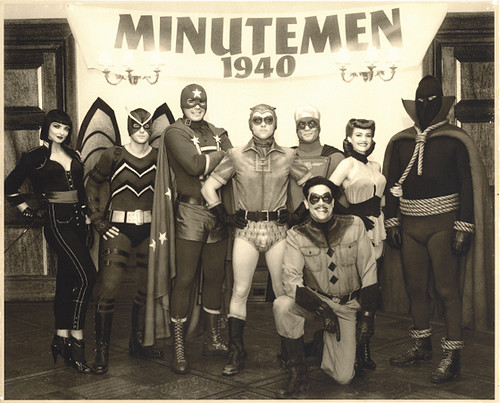
Wait a minute. How could the most beloved comic series of all time stop so many people in their tracks or keep them from plowing through to the end? Why do I have to read it over and over again to build my love for the book further? It’s because in the last two decades, the appreciation of Alan Moore and Dave Gibbon’s Watchmen has become the widely accepted magic password into an exclusive club of comic book and literary elitists who actually DO believe each other’s own hype. Yes, the book is great, but is it the say all and end all masterpiece for the entire comic book medium?
Using that framework really limits the narrative art form to the strict confines of the superhero commentary on society. If you’re ready to treat things like that, why don’t you use Watchmen as the medium’s epitaph and clearly state that comic books will never be anything MORE than superhero stories as social commentary when you and I know that they are so much more? For the past two decades, I’d argue that the careful placement of Watchmen at the top of all things superhero has done just as much to HURT the readership of comics as it has done to exemplify everything it can aspire to be (with the promise of more). Sooner or later, we’ve got to move beyond Watchmen.
What do we tell the people who heard about Watchmen being so great, who then picked it up, didn’t get it and thought lesser of the comic book medium because of it? Comic book elitists in their postered-up windowed club houses might LIKE that their prime choice of entertainment has become a bit more exclusive. But for Geekscapists like you and myself, who enjoy sharing the stories that we love with as many people as possible, giving them a book that had as big a chance of losing them as turning them further onto comics just will not do.
Thank god that Zack Snyder came along and made a version of Watchmen for people to enjoy. This version of Watchmen is the way that the long and winding road to the big screen had to end: with a focus on the story’s characters playing first and foremost against the backdrop of societal Armageddon. The movie is told so clearly that some audience members no doubt found it too slow. Only Jeffrey Lyons seems to have found the plot to be too complicated (as he warned audiences in his televised review).
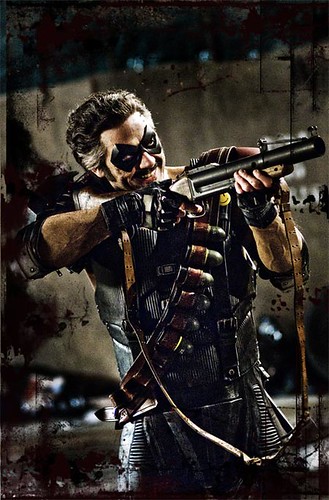
“Hey, Jeffrey Lyons! You’re a fucktard! There’s something on your face!”
From the first frame of this film until the very last, I was completely in love with everything that I experienced. Yes, the makeup on Nixon and the older Silk Specter is noticeable… but listen to the things that they are saying and putting into motion! Yes, Malin Akerman’s first bits of dialogue land a bit flat and expositional after all of the textured work we’d seen in the film so far… but there’s a six story BLUE GUY STANDING RIGHT THERE (and her acting and characterization are absolutely spot on the rest of the way)! Yes, the music is a presence in the film, but I challenge any and all haters to try and conjure up any alternatives that would have handled these complicated moments so well (and Flight of the Valkyries plays a roll in Hollis Mason’s “Under The Hood” from the original book so seeing it here was a nice touch). Is the sex scene awkward? It’s SUPPOSED to be awkward! It’s two completely inadequate individuals finding solace in each other after years of loneliness! Who CAN’T relate to that? Did you want something out of The Red Shoe Diaries to get you hot? In addition, even with a similar screen time, Watchmen doesn’t have the 4th Act that The Dark Knight does where you’re watching the citizens of Gotham decide whether or not to blow each other up in a game of Battleship while the Joker and Batman trade punches that have zero influence on the resolution of the scene blocks away from the tension.
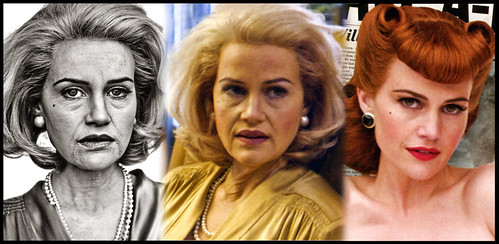
This is the Watchmen that I experienced as a kid and that I would not be afraid to recommend to people. I actually stopped recommending the comic book version about ten years ago. Every humanizing character flaw and monstrous act present in the book is present here but elaborated on clearly. We don’t just HINT that The Comedian shot JFK… we see it. Every act of physical violence is up close and personal and does as much to define the instigator as it does the victim. The through line of the murder mystery from the comic series is now truncated to focus exclusively on the central characters’ involvement without turning their struggles into high concept action set pieces. We don’t spend the time following the criminal psychologist home in the movie like we do in the book. Everything that we need to know in order to care about these characters is given to us in an economic and compelling way. This is indeed the way that the decades old Church of Watchmen Snobbery had to end. It had to be truncated and popularized.
And the ending to the movie is a complete improvement. Ozymandias’ final act isn’t just horrific… it completely destroys Dr. Manhattan and ties into the actions of every character involved in the plot. The Giant Squid from the alternate dimension that landed only on New York is fine for the four colored version, but having the destruction of major cities around the globe blamed completely on your friend in order to get him out of the way? This makes interpersonal actions at the end of the film are almost as horrific as the mass murdering of millions. Tying everything into the central characters’ stories is a complete streamlining and improvement on something that in the comic version always felt a bit too left field at the end of a story that paid so much attention to narrative detail.
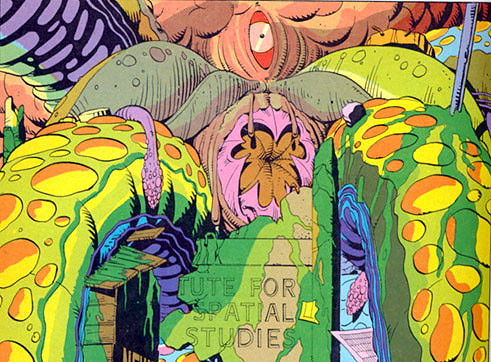
This is a grand stage that Snyder is working on and the balancing act between character and action set pieces that he layers carefully throughout the movie builds to what I think is one of the most satisfying climaxes I’ve seen in any movie, superhero or otherwise. When Jon explodes Rorschach… that’s it. There is no going back. Dr. Manhattan is not going to try and fix what Ozymandias has put forward. He is not going to work with Dan or console Laurie about the realization that The Comedian is her father. More so than the destruction of cities around the planet or the final fight scene in Ozymandias’ chamber, that act is the ultimate climax of the character arcs woven throughout the film. Rorschach has done all he can by sending his journal to the news publication. He is now the embodiment of a discreditable loose end. He HAS to make Jon kill him for him to win. He HAS to remove Jon and himself from the equation. And Jon (who can see the future, don’t forget) knows this. If Rorschach lives, Ozymandias still has a chance at winning. He has to force Jon to remove him from the board. The shot that Snyder added, that is NOT in the comic book, of Rorschach’s exploded body splayed out on the snow like a final ink-blot is a complete master stroke and the signature on Rorschach’s final crime solved. Remember the opening piece where the police officer finds the Rorschach test as a calling card for the masked vigilante? This shot is that final calling card. Rorschach has struck again for the last time. Now the movie can wrap up and not even Ozymandias will try and stop it.
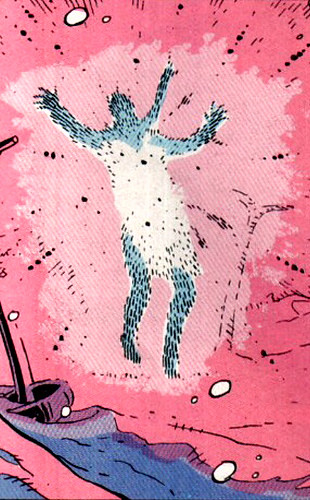
This shit literally WAS the bomb.
You know what? I don’t know what to say to people who don’t like this film. I can only imagine that it’s similar to what people found when they couldn’t access the comic series. I have to imagine that not everyone is going to love this movie as completely as I did. And it’s unfair of me to tell them to put in the repeat viewings necessary to “appreciate” the movie in the same way many of us gave the trade paperback repeat readings. Stories should always work well from the first telling and become great in the revisiting.
If anything, I can take comfort in the fact that Zack Snyder and company created a film that can be as widely debated as the original source material. I know that I haven’t even come close to scratching the surface of this film and I can’t wait to experience repeat viewings (and the addition of the supplementary materials Under the Hood and The Black Freighter!). I can’t wait to talk about it further with all of you. So knowing that this movie now exists in this final form, after all of the work that went into trying to get it made over the past twenty years, and having it land so closely to the original product, I tell you again: this is exactly the way that its journey had to end, with the spark that will leave us debating it for another twenty years.
